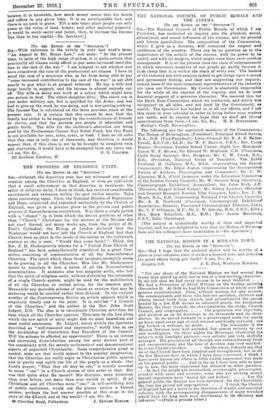THE PROGRESS OF RELIGIOUS UNITY.
(To THE EDITOR OF THE " SPECTATOR.")
SIR,—Although the departing year has not witnessed any act of reunion among the Churches in England, or even an indication that a small achievement in that direction is imminent, the spirit of religions unity, I dare to think, has received considerable enrichment and extension within the past twelve months. Take three interesting signs. First, the National Mission of Repentance and Hope, originated and organized exclusively by the Church of England, was given a genuine place in the private and public prayers of Nonconformists everywhere. Was there a single parish with a " chapel" in it from which the devout petitions of other than " Church" Christians for the success of the Mission did not rise? Second, not many weeks ago, from the pulpit of St. Paul's Cathedral, the Bishop of London declared that the Wesleyans would not have left the Church of England had that Church been as alert to the needs of the nation in the eighteenth century as she is now. " Would they come back?" Third, the Rev. J. H. Shakespeare's scheme for a " United Free Church of England" has been sympathetically considered by a great Com- mittee consisting of representatives of all the Nonconformist Churches. The spirit which these three incidents exemplify seems to be growing in all the Churches. Men like Mr. Shakespeare desire to translate it into a union of all the Nonconformist denominations. It animates also less sanguine souls, who feel that the spirit of religious unity, without disturbing the autonomy of a single Church system, might be used for the mobilization of all the Churches in united action for the common good. Meanwhile any desirable scheme of union or reunion that may be maturing would be assisted rather than delayed. In the current number of the Contemporary Review an article appears which is singularly timely and to the point. It is entitled "A Council of the Churches," and the author is the Rev. John Scott Lidgett, D.D. The idea is to co-ordinate Christian activities for ands which all the Churches approve. This may be the line along which the new spirit of unity might find its most immediate and most useful expression. Dr. Lidgett, whose article the Spectator described as " well-reasoned and impressive," would like to see the Archbishop of Canterbury first President of the Council. Will the scheme be afforded an opportunity? There is an intense and increasing dissatisfaction among the most serious part of the community with the merely ecclesiastical and denominational aspects of organized Christianity. Some comprehensive proof is needed, some act that would appeal to the popular imagination, that the Churches are really eager to Christianize public opinion and to purify and uplift the life of the people as a whole. Our Lord's prayer, "That they all may be one," is usually assumed to mean " one" in a Church system of this order or that. But was that quite what He meant? His disciples, more numerous than ever before, are more than ever united in spirit. If all -Christians and all Churches were " one " in self-sacrificing acts of public usefulness, would not the prayer receive a blessed answer, perhaps the best answer possible at this stage in the story of the Church and of the world ?—I am, Sir, Sze.,


































 Previous page
Previous page